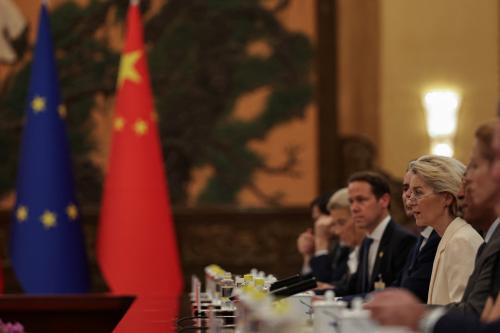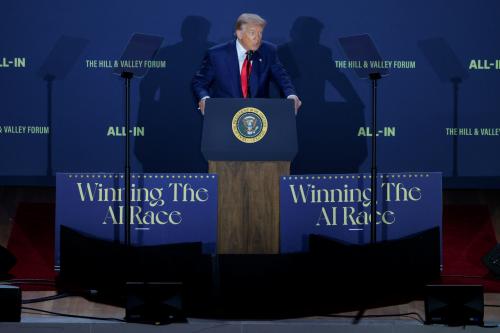Groucho Marx once remarked that he would not want to join any club that would have him as a member. But Marxist principles of either the comedic or the doctrinal variety don’t apply to the Asian Infrastructure Investment Bank (AIIB), China’s major foray into creating a multilateral lending institution that Beijing contends will complement the World Bank and the Asian Development Bank (ADB). On March 12, the United Kingdom announced that it would apply for founding membership in the bank, the first major power outside the Asia-Pacific region to do so. Two days later, Saudi Arabia joined the list of founding states, bringing the membership total to 26.
Others, including several major U.S. allies in Asia and the Pacific, could follow suit. In an interview with The Australian, Australian Prime Minister Tony Abbott acknowledged that his government was “looking carefully” into following the lead of the U.K. and other states that have joined the bank, and promised a decision within the next two weeks. (The deadline on applying for founding membership is March 31.) According to the Maiel Business Newspaper in Seoul, the United States and South Korea have reached a “principled consensus” that would also enable Seoul to join. Washington’s earlier efforts to convince Australia and South Korea to remain outside the bank thus seem increasingly tenuous.
Major moves are also afoot among other developed European economies. According to the Financial Times, in the wake of Britain’s decision France, Germany and Italy have all decided to join the AIIB. But the United States and Japan remain on the outside looking in. As the two dominant powers in the World Bank and the ADB, Washington and Tokyo are clearly wary about ceding ground to Beijing. Both states repeatedly declare that they want to fully involve China in building a 21st century international order; the prospects seem more promising in the global economy than anywhere else. However, by maintaining their distance from the bank, American and Japanese responses seem problematic at best and churlish at worst. They also fuel Chinese suspicions that the United States and Japan are unprepared to accord China international standing commensurate with its increased economic weight.
The Obama administration insists that it is not opposed to the creation of the bank, but it argues that there are far too many unanswered questions to warrant endorsement of the AIIB, at least at present. Administration officials contend that the AIIB’s governance arrangements rest far too much on Chinese assurances, without the bank demonstrating its ability to adhere to existing norms, policies, and practices that would govern future lending. Senior U.S. officials also openly express wariness that China’s majority stakeholder position in the bank would enable it to dominate all lending decisions. Thus, notwithstanding Asia’s prodigious infrastructural requirements that the AIIB will help address, the United States believes the bank would largely serve to advance Chinese policy objectives. It would also potentially undermine, if not supplant, existing international economic institutions.
The weakness in the U.S. critique is both temporal and operational: how can the AIIB demonstrate its competence and credibility if other actors choose to remain outside it? Yet, in the Obama administration’s view, Britain’s decision to join the bank denies other major economic actors the best means to ensure Chinese adherence to extant international practices. In the words of one senior American official, “Large economies can have more influence by staying on the outside and trying to shape the standards it adopts than by getting on the inside at a time when they can have no confidence that China will not retain veto powers.” But this presumes that the only means to influence rule making would be to refuse to join.
The United Kingdom, no doubt in part to advance its own economic interests, rejected this reasoning. However, if other established economies who have decided to join the bank insist on the principle that voting shares reflect the financial contributions of various members, then the leverage of individual states would be enhanced. London presumably sees this alternative course as the best means to ensure full participation of other members, thereby reducing the singularity of China’s role.
The differences between the United States and some of its closest international partners thus rest on a fundamental divergence in judgment: are the interests of established powers better served by being inside the AIIB tent rather than outside it? And will withholding support for the bank advance or diminish Chinese incentives to contribute to the building of a cooperative, rules-based international order? The United Kingdom, and reportedly other advanced economies, has concluded that the preferred way to answer these questions is to test them. It remains to be seen how the United States will respond.
The Brookings Institution is committed to quality, independence, and impact.
We are supported by a diverse array of funders. In line with our values and policies, each Brookings publication represents the sole views of its author(s).




Commentary
Joining the club: How will the United States respond to AIIB’s expanding membership?
March 17, 2015